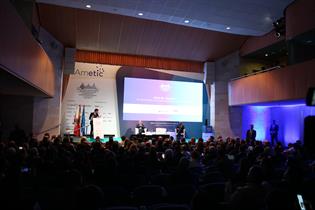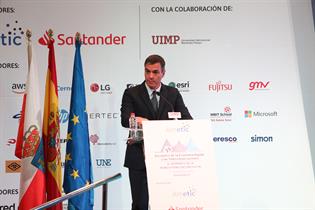At a meeting in Santander on the digital economy and telecommunications
Pedro Sánchez argues that digitalisation is an opportunity to create fairer and more equal societies
President's News - 2019.9.4
Images of the event | Pool Moncloa/Diego del Monte - 2019.9.4
Palace of La Magdalena, Santander
Pedro Sánchez addressed the benefits and risks of robotics and artificial intelligence in the closing session of the 33rd Digital Economy and Telecommunications Meeting, organised by the Association of Electronics, Information Technology, Telecommunications and Digital Content Companies (Spanish acronym: AMETIC) at the International Menéndez Pelayo University (UIMP).
In his speech, the Acting President of the Government listed some of the advantages of digitalisation that will free us from mechanical tasks, revolutionise education, medicine and mobility, create smart cities and, in short, transform our daily lives to make them more comfortable, safer and more efficient.
Pedro Sánchez warned that digital development will also mean that machines replace close to 20 million jobs around the world in the next decade, creating generational, business and human gaps that he described as "unacceptable". Another danger he warned of is the use of data extracted from search histories and the public conduct of Internet users, which brings "our digital window to the world" closer and can condition access to jobs, insurance or a loan, for example.
Along this line, the Acting President of the Government declared that politics and civil society must renew the social pact so that progress is a source of opportunities for everyone. "No progress will be true progress if it leads to a risk of part of society being left behind".
International regulation
 Pool Moncloa/Fernando CalvoPedro Sánchez praised the European model which, in addition to growth, places humans at the centre of any transformations. The European Commission, he recalled, published in April the guidelines on the development of artificial intelligence at the service of our citizens, which is safe and transparent, safeguards privacy and avoids discrimination.
Pool Moncloa/Fernando CalvoPedro Sánchez praised the European model which, in addition to growth, places humans at the centre of any transformations. The European Commission, he recalled, published in April the guidelines on the development of artificial intelligence at the service of our citizens, which is safe and transparent, safeguards privacy and avoids discrimination.
The Acting President of the Government stressed that the changes caused by digitalisation and globalisation require "the rules of the game to be changed" at a global level. "The governance of these phenomena requires the urgent involvement of supranational bodies", stated Pedro Sánchez, who agreed with the experts that call for a Digital Constitution to be drawn up, within the framework of the United Nations, which establishes the rights and obligations of corporations, public authorities and citizens against this new backdrop.
He also advocated reinventing the education system so that it adapts to the labour market, but also to give greater weight to humanistic wisdom. He also defended the search for a social consensus on privacy and the use of information, as well as the regulation of the use of personal data.
Leadership of Spain
For the first time, stressed Pedro Sánchez, Spain has arrived at an industrial revolution prepared to play a leading role: it is the European country with the greatest fibre optic coverage in homes (77.4%) and the eighth in the world in terms of Internet inclusivity, and Madrid and Barcelona appear on the list of the 10 European cities with the most digital start-ups in 2018.
 Pool Moncloa/Fernando CalvoThese figures, he indicated, cover all sectors and "view without complexes" the global economic eco-system. "But although we have the foundations laid to place us as a leading country in the digital transformation, we still have a lot to do in artificial intelligence", said Pedro Sánchez, who advocated drawing up a National Artificial Intelligence Plan.
Pool Moncloa/Fernando CalvoThese figures, he indicated, cover all sectors and "view without complexes" the global economic eco-system. "But although we have the foundations laid to place us as a leading country in the digital transformation, we still have a lot to do in artificial intelligence", said Pedro Sánchez, who advocated drawing up a National Artificial Intelligence Plan.
The closing session of the event was also attended by the Acting Minister for Industry, Trade and Tourism, Reyes Maroto; the Government Delegate in Cantabria, Eduardo Echevarría; the State Secretary for Digital Development, Francisco Polo; the State Secretary for Universities, Ángeles Heras; the Secretary-General for Industry, Raúl Blanco; the President of AMETIC, Pedro Mier; the Rector of the UIMP, María Luz Morán, and the Chairman of Santander España-Banco Santander, Rodrigo Echenique.
Non official translation





